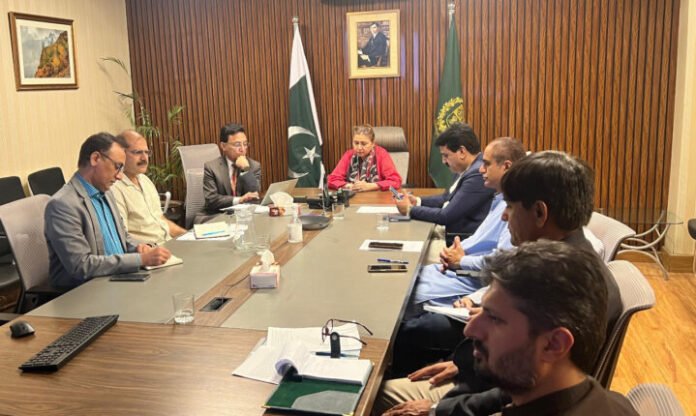ISLAMABAD – A high-level consultative meeting with electric vehicle (EV) manufacturers was convened at the Ministry of Climate Change and Environmental Coordination (MoCC&EC) to discuss strategies for fast-tracking the country’s transition to electric mobility, according to a press release issued here on Friday.
Chaired by Secretary MoCC&EC, Ms. Aisha Humera Moriani, the session focused on scaling up charging infrastructure, accelerating motorcycle retrofitting and exploring financing mechanisms to support the shift from fossil fuels to clean energy.
Participants examined financing opportunities through financial institutions to improve accessibility and affordability of EVs. The deliberations aligned with Pakistan’s commitments under its 2021 Nationally Determined Contributions (NDCs), which set a target of 30% EV adoption by 2030. The transition is part of broader efforts to reduce greenhouse gas emissions, curb air pollution and smog, and promote sustainable transport solutions.
The meeting was attended by senior officials, including Mr. Zulfiqar Younas, Additional Secretary, MoCC&EC; Mr. Asif Saeed Khan, Additional Secretary, Ministry of Industries and Production; Mr. Khuda Bakhsh Ali, CEO, Engineering Development Board; Mr. Muhammad Asif Sahibzada, Director General (Env. & CC); and Mr. Muhammad Azeem Khoso, Director (Urban Planning) of MoCC&EC and representatives from leading EV manufacturing and importing firms also participated.
Key discussions centered on converting the existing fleet of fuel-powered two-, three- and four-wheelers to electric. Participants highlighted the economic and environmental benefits of this transition and called for robust national commitment and enabling policies to enhance EV penetration.
Industry representatives raised concerns regarding insufficient charging infrastructure and the high cost of EV ownership. They stressed the need to develop modern charging facilities, particularly along highways and motorways, to support sustainable sectoral growth.
Secretary Moriani acknowledged these concerns, stating: “Inadequate EV charging infrastructure, particularly in urban areas, is a major barrier. Without significant investment in this area, the transition to electric mobility will remain out of reach.”
Mr. Muhammad Asif Sahibzada, DG (Env. & CC), underscored the importance of retrofitting, noting that Pakistan has over 37 million fuel-powered vehicles, including 28.7 million petrol motorcycles, which are major contributors to pollution. “Standardized retrofitting offers a cost-effective, scalable solution, especially in the motorcycle segment, which dominates Pakistan’s transport landscape,” he said
Meanwhile, the MoCC&EC Secretary Ms Aisha Humera Moriani added that electrifying two-wheelers would significantly reduce fuel costs and emissions, in line with the Prime Minister’s Green Pakistan vision to promote sustainable technologies.
The Ministry also stressed the urgency of developing a robust regulatory framework for motorcycle retrofitting to ensure safety, quality, and performance and to establish clear guidelines and enforcement mechanisms.
Moreover, the Secretary advocated for a shift from reliance on imported Completely Built Units (CBUs) to the local assembly of Completely Knocked Down (CKD) EVs. “Encouraging CKD production will lower costs, support domestic industry, and generate green jobs nationwide,” she emphasised.




